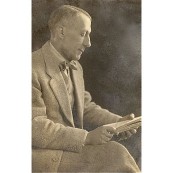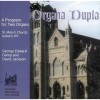传记
Martin Edward Fallas Shaw OBE, FRCM (9 March 1875–24 October 1958) was an English composer, conductor and (in his early life) theatre producer. His over 300 published works include songs, hymns, carols, oratorios, several instrumental works, a congregational mass setting (the Anglican Folk Mass) and four operas including a ballad opera.
Shaw delighted in describing himself as a cockney,[1] a title he could claim under Samuel Rowlands's definition of one born within the sound of the Bow Bells.[2] He was the son of the Bohemian and eccentric[3] James Shaw, composer of church music and organist of Hampstead Parish Church. He was the elder brother of the composer and influential educator Geoffrey Shaw and the actor Julius Shaw, whose career was cut short by the First World War - he was killed in March 1918. He studied under Stanford at the Royal College of Music, together with a generation of composers that included Holst, Vaughan Williams and John Ireland. He then embarked upon a career as a theatrical producer, composer and conductor, the early years of which he described as "a long period of starving along".[4]
With Gordon Craig, he founded the Purcell Operatic Society in 1899,[5] dedicated to reviving the music of Henry Purcell and other English composers of the period, many of whose works had fallen into long neglect. Their first production in 1901 was Purcell's Dido and Aeneas, at the Hampstead Conservatoire. This was well received and transferred to the Coronet Theatre, where it played alongside Ellen Terry's production of Nance Oldfield. It was also Craig's first outing as stage director. The POS's other productions were The Masque of Love from Purcell's semi-opera, Dioclesian (1901) and Handel's Acis and Galatea (1902). In 1903, Martin joined Ellen Terry's company at the Imperial Theatre, where he composed and conducted the music for productions of The Vikings and Much Ado About Nothing, also directed by Craig, Ellen Terry's son.[4]
He proposed to Edith Craig, Craig's sister, in 1903 and was accepted. Edy was a successful, prolific but now largely forgotten theatre director, producer, costume designer and early pioneer of the women's suffrage movement in England. The marriage was prevented by Ellen Terry, out of jealousy for her daughter's affection, and by Christabel Marshall (Christopher St John), with whom she lived from 1899, according to Michael Holroyd in his book A Strange Eventful History (2008).[6] A thinly fictionalised account of this episode appears in St John's autobiographical novel Hungerheart: The Story of a Soul (1915).
Shaw then toured Europe as conductor to Isadora Duncan, extensively described in his 1929 autobiography Up to Now published by Oxford University Press.[4][7] During this period he gave music lessons and took posts as organist and director of music, first at St Mary's, Primrose Hill 1902 - 1920, later at St. Martin-in-the-Fields, London 1920 - 1924. He was also master of music at the Guildhouse, London.
After his marriage to Joan Cobbold, he settled down to family life. The couple had three children: John Fallas Cobbold Shaw (1917–1973), Richard Brinkley Shaw (1920–1989), and Mary Elizabeth Shaw (1923–1977).[8] Under the influence of his wife, and faced with the need to support his family, church music gradually became the focus of his life and work.[citation needed] In 1918 he co-founded the League of Arts, the Royal School of Church Music and was an early organiser of hymn festivals. He did much editorial and executive work in connection with popularising music, the encouragement of community singing and raising standards of choral singing in small parish churches.
In 1932 Shaw received the Lambeth degree of Doctor of Music. He was appointed an OBE in 1955 and was made a Fellow of the Royal College of Music (FRCM) in 1958.[5]
His nephew was the actor Sebastian Shaw, who played the unmasked Darth Vader and the ghost of Anakin Skywalker in Star Wars Episode VI: Return of the Jedi (1983).
His published works include over 100 songs (some of them for children), settings for soli, chorus and orchestra of Laurence Binyon's Sursum Corda, Eleanor Farjeon's The Ithacans, John Masefield's The Seaport and her Sailors; a ballad opera by Clifford Bax, Mr Pepys, and Water Folk, written for the Worcester Music Festival held in September 1932. He composed the music for T.S. Eliot's pageant play, The Rock, (performed at the Sadler's Wells Theatre in May 1934), making him the only composer Eliot ever allowed to set his words to music. He later became the first editor of National Anthems of the World, published after his death.
His oratorio The Redeemer, for SATB soloists, chorus and full orchestra, was first broadcast by the BBC in March 1945. His cantata God's Grandeur, to words by Gerard Manley Hopkins, was composed for the first Aldeburgh Festival, receiving its first performance in the same concert as the premier of Britten's St Nicolas.[4]
Working with Percy Dearmer, Martin was music editor of The English Carol Book (1913, 1919) and, with Ralph Vaughan Williams, of Songs of Praise (1925, 1931) and The Oxford Book of Carols (1928). His tune Little Cornard is sung to Hills of the North Rejoice, and Marching is sung to Through the Night of Doubt and Sorrow. While doing research for the English Hymnal (1906) in the British Library, he came upon the traditional Gaelic hymn-tune Bunessan[citation needed] in L. McBean's Songs and Hymns of the Gael, published in 1900. However, the tune was not included in the English Hymnal. It was used instead in the second edition of Songs of Praise (1931), set to the poem Morning Has Broken, which Martin Shaw commissioned specially from his old friend Eleanor Farjeon. This tune and words became a No. 1 hit for Cat Stevens in 1972. Martin Shaw also noted down the Czech carol Rocking and included it in The Oxford Book of Carols.







